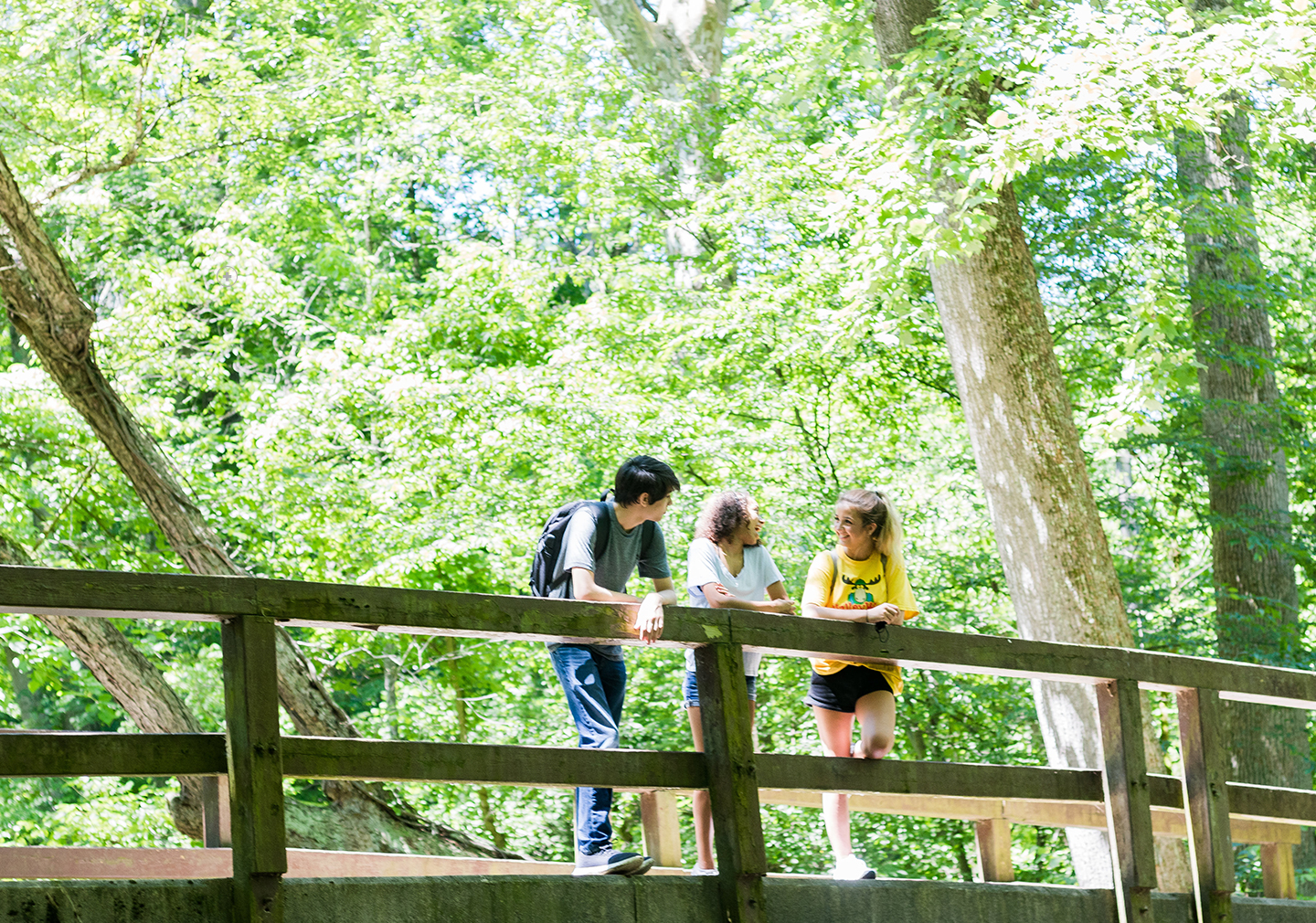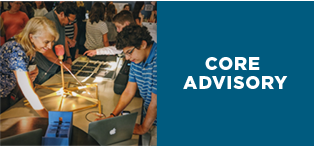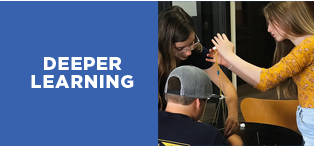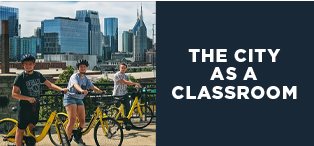
Academics
Purpose-Driven, Student-First Learning
The mission of Templeton Academy is to nurture our Students into purpose-driven lifelong learners who use their gifts in a way that brings them joy and serves others. Our academic model can transform the lives of its Students by providing highly individualized, dynamic, and experiential education in small classes with dedicated and skilled educators.
Templeton Academy is small enough to be personally in touch with every individual, yet large enough to offer a broad range of courses. We combine a warm, inviting community with great teaching that allows our students to flourish in college, career and any setting.
Sample Course Offerings
The middle school curriculum is meant to enrich and enhance Student understanding of the challenges of a rigorous academic program and the skills necessary for success beyond the classroom. It integrates current events, the academic curriculum, and Students’ interests to be as relevant and meaningful as possible to each Student. Students will learn how to develop and apply a range of strategies to improve their learning and achievement, particularly their literacy, numeracy, communication, and planning skills. Leadership, creativity, analytical thinking, decision-making, public speaking, conflict resolution, media literacy, civics and government, and service learning are included topics.
Humanities
Our middle school humanities teachers guide Students through double block combining English and History. This allows teachers to have approximately two hours to go deeper with the content, lead cross curricular projects, and guide off campus excursions.
English
These courses are designed to develop the oral communication, reading, writing, and media literacy skills that Students need for success in their secondary school academic programs and in their daily lives. Students will analyze literary texts from contemporary and historical periods, interpret informational and graphic texts, and create oral, written, and media texts in a variety of forms. An important focus will be on the use of strategies that contribute to effective communication.
History
Students will explore social, economic, and political changes, the historical roots of contemporary issues, and the role of conflict and cooperation in global interrelationships. They will extend their ability to apply the concepts of historical thinking and the historical inquiry process, including the interpretation and analysis of evidence, as they investigate key issues and assess societal progress or decline in world history.
Foreign Language
At Templeton Academy, we offer several foreign languages including Mandarin, Spanish, and French. We require Students to learn different things at specific times to ensure that regardless of language all Students receive the same content.
STEM (Science, Technology, Engineering, Math)
Our STEM teachers shepherd Students through hands-on mathematical and scientific courses. Within the two hour block, Students can conduct science experiments, collaborate on cross curricular projects, and engage in experiential learning throughout the city.
Science
These courses enable Students to develop their understanding of basic concepts in biology, chemistry, earth and space science, and physics, and to relate science to technology, society, and the environment. Throughout the course, Students will develop their skills in the processes of scientific investigation. Students will acquire an understanding of scientific theories and conduct investigations related to sustainable ecosystems; atomic and molecular structures and the properties of elements and compounds; the study of the universe and its properties and components; and the principles of electricity.
Math
These courses include mathematical concepts for working with rational numbers, various expressions, analyzing and solving linear equations & inequalities, data analysis, probability, statistics, and polynomials. Students will reason mathematically and communicate their thinking as they solve multi-step problems.
Art and Exploratory
Templeton Academy offers Drama, Film, Visual Arts, Photography and Music courses where Students will create, perform, discuss, and analyze the arts and then reflect on the experiences to develop an understanding of themselves, the art form, and the world around them. Students will engage with and evaluate the social and cultural forces that have shaped and are shaped by the world of art.
Exploratory courses allow Students to try out different interests through the elective period. These exploratory courses range from cross country running to theater. We think about education as a process of learning how to be, how to do, and how to know. Because of this, our biggest priority in the exploratory period is to find out three things from Students:
- What do you already know and what do you want to know?
- What do you already know how to do and what do you want to know how to do?
- What have you already become and what do you want to become in the future?
TA wants to support Students in understanding their gifts and how they might be used in a way that brings them joy and serves others. Then develop the skills and knowledge aligned with their talents and passions, as well as the opportunities and injustices that they care about most.
Athletics – Nashville
At Templeton Academy Nashville, athletics are for every Student. We provide opportunities for Students to enjoy fitness through competitive sports teams, rock climbing, dance, yoga, crossfit, city walks, and more. Our athletic program strives to promote health and fitness, sportsmanship and teamwork, respect for one’s health and well-being, and positive self-image. We work to create healthy habits and to cultivate each Student’s understanding of the lifelong benefits of physical activity.
As a member of the Tennessee Secondary School Athletics Association (TSSAA), Templeton Academy can compete in various sports with our own teams, or through cooperatives, which allow our Students to take advantage of our partner schools’ top-notch athletics facilities and coaching. As we build our athletics programs, we are developing teams in volleyball, cross country, and track, and forming cooperatives in soccer, basketball and football.
Beyond team sports, we offer a broad range of individual and group fitness activities both during and after school hours. Athletics, like academics, are Student-first, and if we cannot provide an opportunity ourselves or through a cooperative, we allow Students to pursue independent study credit for extracurricular athletics.
The high school curriculum focuses on preparing Students for their lives after high school- both college and career. It provides Students with opportunities to understand the diverse perspectives of and the links among discrete subjects/disciplines and to develop their knowledge and skills beyond the scope of individual disciplines to solve problems, make decisions, and present new findings. Students will integrate general interdisciplinary concepts, skills, models, resources, technologies, and strategies with specific content and approaches from diverse areas of the curriculum.
An important emphasis will be placed on developing information literacy, applying comprehensive research skills and knowledge, and synthesizing methodologies and insights from a variety of disciplines to develop critical- and creative-thinking skills. Academic, personal, post-secondary, and career goals are key areas of discussion. Students are prepared for off-campus experiences such as internships, jobs, and entrepreneurial activities. College counseling topics are included in addition to the one-on-one support provided by the College Counselor.
Foundations
The Foundations course is designed for Students to enrich and enhance their understanding of the challenges of a rigorous academic program as well as the skills necessary for success beyond the classroom. It integrates current events, the academic curriculum, and Students’ interests to be as relevant and meaningful as possible to each Student. The course explores learning strategies and helps Students become better, more independent learners while increasing their personal management skills, both in school and in other contexts. Students will learn how to develop and apply a range of strategies to improve their learning and achievement, particularly their literacy, numeracy, communication, and planning skills. Leadership, creativity, analytical thinking, decision-making, public speaking, conflict resolution, media literacy, civics and government, and service-learning are topics included. Students will complete passion projects.
Humanities
Taking two classes a day and only two per quarter allows Students to deeply engage with the subjects they are studying. Instead of jumping from class-to-class in 45 minute increments, Students have 2 hours and 20 minutes with each subject to explore concepts fully. This model also allows Students and teachers time to make learning hands-on. Educational activities like cooking tacos while speaking only in Spanish or visiting the Capitol for a lesson on politics are only possible in a setting that provides that needed time and space. Similar to a college seminar, Students sit around a conference table beside their teacher and are expected to actively participate in discussion. When on excursions, Students use their bus card and travel around their city with their teacher to enrich content learned in class.
English
These courses emphasize the development of literacy, communication, and critical and creative thinking skills necessary for success in academic and daily life. Students will analyze challenging literary texts from various periods, countries, and cultures, as well as a range of informational and graphic texts, and create oral, written, and media texts in a variety of forms. An important focus will be on using language with precision and clarity and incorporating stylistic devices appropriately and effectively.
- Public Speaking and Presentation:
This course emphasizes the knowledge and skills required to plan and make effective presentations and to speak effectively in both formal and informal contexts, using such forms as reports, speeches, debates, panel discussions, storytelling, recitations, interviews, and multimedia presentations. Students will research and analyze the content and characteristics of convincing speeches and the techniques of effective speakers; design and rehearse presentations for a variety of purposes and audiences; select and use visual and technological aids to enhance their message; and assess the effectiveness of their own and others’ presentations.
Prerequisite: English 9
- The Writer’s Craft:
This course emphasizes knowledge and skills related to the craft of writing. Students will analyze models of effective writing; use a workshop approach to produce a range of works; identify and use techniques required for specialized forms of writing; and identify effective ways to improve the quality of their writing. They will also complete a major paper as part of a creative or analytical independent study project and investigate opportunities for publication and for writing careers.
Prerequisite: English 9
History
Students will extend their ability to apply the concepts of historical thinking and the historical inquiry process, including the interpretation and analysis of evidence when investigating social, political, and economic structures and historical forces at work in various societies and in different historical eras.
- Philosophy, Politics & Economics:
This course is based on the Oxford University program model and benefits from the generous in-kind support and resources provided by members of local, national, and global external organizations throughout the Washington, DC area including: Atlantic Council; Community Partnership for the Prevention of Homelessness; and Street Sense. Students will start by exploring a unifying issue (Homelessness) and expand their exploration to other issues (including Justice; Property; and Voting) from a range of perspectives using Philosophy, Politics, and Economics as areas of focus. Students will engage in experiential exploration of how individual and public philosophy, politics, and economics influence issues encountered in daily life.
Prerequisite: World History to 1500 CE
- Introduction to Anthropology, Psychology, and Sociology
This course provides Students with opportunities to think critically about theories, questions, and issues related to anthropology, psychology, and sociology. Students will develop an understanding of the approaches and research methods used by social scientists. They will be given opportunities to explore theories from a variety of perspectives, to conduct social science, and to become familiar with current thinking on a range of issues within the three disciplines.
Prerequisite: None
Foreign Language
At Templeton Academy, we offer several foreign languages including Mandarin, Spanish, and French. We require Students to learn different things at specific times to ensure that regardless of language all Students receive the same content. Additionally, we have a few Students who partake in independent studies for foreign language, including Latin, American Sign Language, and Polish. In order to take an Independent Study course, the Student must start the foreign language previous to Templeton Academy.
- Spanish I:
This course introduces Students to the Spanish language elements they will need to begin to communicate with native speakers. Students will participate in practical activities in which they can apply their knowledge and skills, and will begin to explore careers that require knowledge of the Spanish language. They will explore aspects of the culture of countries where Spanish is spoken, including social customs, music, and food, by participating in cultural events and activities involving both print and computer technology.
Prerequisite: None
- French IV:
This course provides extensive opportunities for Students to speak and interact in French independently. Students will apply language-learning strategies in a wide variety of real-life situations, and will continue to develop their creative and critical thinking skills through responding to and interacting with a variety of oral and written texts. Students will also continue to enrich their understanding and appreciation of diverse French-speaking communities and to develop the skills necessary for life-long language learning.
Prerequisite: French III
STEM (Science, Technology, Engineering, Math)
Each day differs, but typically classes average 3 transitions within a 2 hour and 20 min block and might include group and individual work (lab, projects, problem-solving sessions), Student presentations, excursions, quizzes or tests, and breaks.We take hands-on learning seriously and use the city’s vast resources to deepen our understanding of the world and the subjects we’re studying. We’re also a small school where everyone knows everyone else and classes average only 10 Students each. Because of this, every Student is known and expected to engage every day.
Science
These courses enable Students to enhance their understanding of the concepts in biology, chemistry, earth and space science, and physics, and of the interrelationships between science, technology, society and the environment. Students are also given opportunities to further develop their scientific investigation skills. Students will plan and conduct investigations and develop their understanding of scientific theories related to the connections between cells and systems in animals and plants; chemical reactions, with a particular focus on acid-base reactions; forces that affect climate and climate change; and the interaction of light and matter.
- Computer Science I:
This course introduces Students to computer programming. Students will plan and write simple computer programs by applying fundamental programming concepts, and learn to create clear and maintainable internal documentation. They will also learn to manage a computer by studying hardware configurations, software selection, operating system functions, networking, and safe computing practices. Students will also investigate the social impact of computer technologies, and develop an understanding of environmental and ethical issues related to the use of computers.
Prerequisite: None
- Environmental Science:
This course provides Students with the fundamental knowledge of and skills relating to environmental science that will help them succeed in life after secondary school. Students will explore a range of topics, including the role of science in addressing contemporary environmental challenges; the impact of the environment on human health; sustainable agriculture and forestry; the reduction and management of waste; and the conservation of energy. Students will increase their scientific and environmental literacy and examine the interrelationships between science, the environment, and society in a variety of areas.
Prerequisite: Integrated Science II
Math
These courses enable Students to broaden their understanding of relationships and extend their problem-solving and algebraic skills through investigation, the effective use of technology, and abstract reasoning. Students will explore math relations and their applications; solve and apply linear systems. Students will reason mathematically and communicate their thinking as they solve multi-step problems.
- Statistics:
This course broadens Students’ understanding of mathematics as it relates to managing information. Students will apply methods for organizing large amounts of information; solve problems involving counting techniques, probability, and statistics; and carry out a culminating project that integrates the expectations of the course.
Prerequisite: Functions or Functions & Applications
- Advanced Calculus:
This course provides Students with the opportunity to further develop their understanding of derivatives and integrals. Students will expand their comprehension of the concepts of calculus and vectors by considering derivatives of planar curves given in parametric, polar and vector form. Students will investigate the use of Euler’s Method and of L’Hopital’s Rule and determine appropriate situations for their application. Students will expand their understanding of integrals and will be introduced to improper integrals, using them to model physical, biological and economic situations. Taylor Series and Maclaurin Series will be introduced as tools for approximating functions.
Prerequisite: Calculus and Vectors
Art and Electives
Templeton Academy offers Drama, Film, Visual Arts, Photography and Music, and Students have input into which electives are offered each term. Students will create, perform, discuss, and analyze the arts and then reflect on the experiences to develop an understanding of themselves, the art form, and the world around them. Students will engage with and evaluate the social and cultural forces that have shaped and are shaped by the world of art.
- Drama and Theater Studies:
This course provides opportunities for Students to explore dramatic forms and techniques as well as the history and theory behind the world of theater. The course will employ material from a wide range of sources and cultures. Students will use the elements of drama to examine situations and issues that are relevant to their lives. Students will create, perform, discuss, and analyze drama, and then reflect on the experiences to develop an understanding of themselves, the art form, and the world around them. Students will engage with and evaluate the social and cultural forces that have shaped and are shaped by the world of drama and theater.
Prerequisite: None
- Visual Arts – Photography II
This course focuses on enabling Students to refine their use of the creative process when creating and presenting two- and three-dimensional art works using a variety of traditional and emerging media and technologies. Students will use the critical analysis process to deconstruct art works and explore connections between art and society. The studio program enables Students to explore a range of materials, processes, and techniques that can be applied in their own art production. Students will also make connections between various works of art in personal, contemporary, historical, and cultural contexts.
Prerequisite: Photography I
Field Study
Templeton Academy Students choose a specialization that they focus on during high school, which enables Students to explore their gifts. At Templeton Academy, we’re very proud to have embraced the micro school model and the level of learning, personalization, and community that comes with such a structure.
Special Education
Templeton Academy realizes that Students may need accommodations such as extended time or small classes. TA offers that in its model. While we do not have IEPs, we do honor internal accommodation plans based on psycho-educational testing. We create internal accommodation plans that continue previous learning plans. We ensure Students get the accommodations needed for external testing like the ACT or PSAT. TA recommends that parents complete psycho-educational testing every three years through an external provider, particularly before a Student leaves for college, to ensure accommodations continue.
Athletics – Nashville
At Templeton Academy Nashville, athletics are for every Student. We provide opportunities for Students to enjoy fitness through competitive sports teams, rock climbing, dance, yoga, crossfit, city walks, and more. Our athletic program strives to promote health and fitness, sportsmanship and teamwork, respect for one’s health and well-being, and positive self-image. We work to create healthy habits and to cultivate each Student’s understanding of the lifelong benefits of physical activity.
As a member of the Tennessee Secondary School Athletics Association (TSSAA), Templeton Academy can compete in various sports with our own teams, or through cooperatives, which allow our Students to take advantage of our partner schools’ top-notch athletics facilities and coaching. As we build our athletics programs, we are developing teams in volleyball, cross country, and track, and forming cooperatives in soccer, basketball and football.
Beyond team sports, we offer a broad range of individual and group fitness activities both during and after school hours. Athletics, like academics, are Student-first, and if we cannot provide an opportunity ourselves or through a cooperative, we allow Students to pursue independent study credit for extracurricular athletics.

Templeton Academy Students have been accepted to these colleges, universities, and post-secondary programs.
Allegheny College
American
University
AmeriCorps NCCC
Appalachian
State
University
Arizona State
University
Bard College
Berlin
Belmont
University
Beloit
College
Berklee College of Music
Berry
College
Bowie State University
Butler
University
Champlain College
Clark University
Clarkson University
Colorado State
University
David Lipscomb University
Davidson
College
Denison University
Eckerd
College
Elon
University
Embry-Riddle Aeronautical University
Emerson College
Eugene Lang College of Liberal Arts at the New School
Flagler
College
Fordham
University
Furman
University
George Mason University
Gettysburg
College
Goucher College
Guilford College
High Point University
Hofstra University
Hood
College
Humboldt State
University
Indiana State
University
Jacksonville University
James Madison University
Juniata College
Kenyon College
Knox College
Lipscomb University
Loyola
Marymount
University
Loyola
University
Maryland
Loyola University
New Orleans
McDaniel College
Methodist
University
Michigan State University
Middle Tennessee State University
Minnesota State
University
Muhlenberg
College
New College
of Florida
Oberlin College of Arts and Sciences
Pacific Lutheran
University
Pratt Institute
Queens University of Charlotte
Reed College
Ringling College of Art & Design
Roger Willams University
Rollins College
Rose-Hulman Institute of Technology
Royal Melbourne Institute of Technology (Australia)
Sarah Lawrence College
Savannah College of Art & Design
Seton Hall
University
Skidmore College
Southeastern
University
St. John’s College
(Annapolis)
St. Mary’s College of Maryland
St. Olaf College
SUNY at
Albany
Temple University (Honors Program)
The American University of Paris
The New School
The Ohio State University
Transylvania University
University of
Alabama
University of Arizona
University of Colorado Boulder
University of Connecticut
University of Dayton
University of Denver
University of Hartford (Engineering Program)
University of Houston
University of Massachusetts Dartmouth
University of Pittsburgh
University of Maryland, College Park
University of Mary Washington
University of Miami
University of Minnesota, Twin Cities
University of North Carolina at Asheville
University of North Dakota
University of
North Florida
University of Oregon
University of South Carolina
University of South Florida
University of Tampa
University of Tennessee Knoxville
University of
Vermont
University of Washington
University of Wilmington
University of Wisconsin, Madison (Engineering Program)
Ursinus College
Virginia Commonwealth University
Virginia Polytechnic Institute and State University
Warren Wilson College
Wesleyan University
Western Michigan University
Wheaton College
Wilkes University



